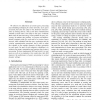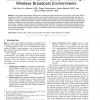113
click to vote
JPDC
2010
15 years 16 days ago
2010
We observe two deficiencies of current query processing and scheduling techniques for sensor networks: (1) A query execution plan does not adapt to the hardware characteristics o...
131
Voted
SIGIR
2008
ACM
15 years 16 days ago
2008
ACM
Results caching is an efficient technique for reducing the query processing load, hence it is commonly used in real search engines. This technique, however, bounds the maximum hit...
175
click to vote
ISEMANTICS
2010
15 years 16 days ago
2010
The Web has evolved from a global information space of linked documents to a web of linked data. The Web of Data enables answering complex, structured queries that could not be an...
114
click to vote
CIKM
2010
Springer
15 years 20 days ago
2010
Springer
Most database systems allow query processing over attributes that are derived at query runtime (e.g., user-defined functions and remote data calls to web services), making them e...
CIKM
2010
Springer
15 years 20 days ago
2010
Springer
Marking up queries with annotations such as part-of-speech tags, capitalization, and segmentation, is an important part of many approaches to query processing and understanding. D...
129
click to vote
PVLDB
2008
15 years 1 months ago
2008
In this paper we propose a novel document retrieval model in which text queries are augmented with multi-dimensional taxonomy restrictions. These restrictions may be relaxed at a ...
112
click to vote
VLDB
2002
ACM
15 years 1 months ago
2002
ACM
Traditional indexes aim at optimizing the node accesses during query processing, which, however, does not necessarily minimize the total cost due to the possibly large number of r...
122
click to vote
NGC
2000
Springer
15 years 1 months ago
2000
Springer
With the increasing popularity of the WWW, the main challenge in computer science has become content-based retrieval of multimedia objects. Access to multimedia objects in database...
131
click to vote
DEBU
2000
15 years 1 months ago
2000
Wide-area distribution raises significant performance problems for traditional query processing techniques as data access becomes less predictable due to link congestion, load imb...
105
click to vote
TMC
2008
15 years 2 months ago
2008
Location-based spatial queries (LBSQs) refer to spatial queries whose answers rely on the location of the inquirer. Efficient processing of LBSQs is of critical importance with the...




